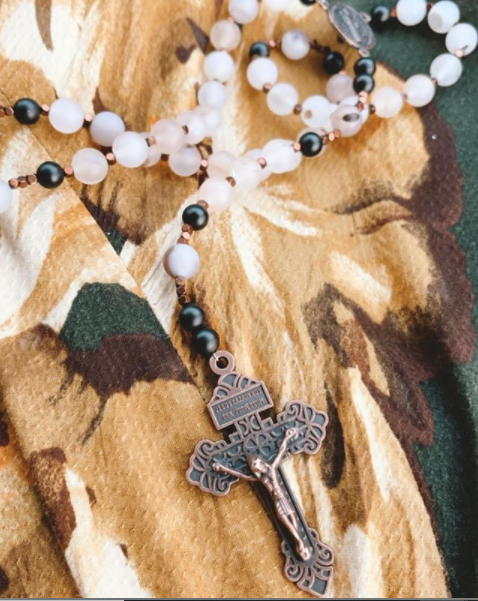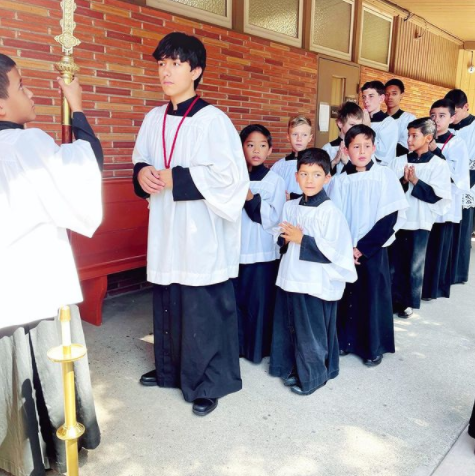My children choose their saints, aside from me having to say no repeats (of St. Michael & St. George).
Each child is also responsible for coming up with a short speech about their saint. We help them memorize their speech for the Vigil festivities. Sometimes they nail it and other times it’s an abbreviated variation at best.
They even design their costumes, for the most part. Big siblings and I are charged with the task of putting it together to their liking.
This year, my littlest one chose his beloved friend from the Bible.
Dad even attempted to give him lessons on using his weapon of choice.
Great discussions (at his level) we’re had about praying for courage, following God’s will in all seasons of our lives, not listening to what the world would have us believe, and trusting that God can do all things.
This boy of mine has loved this heroic priest since an early age. 💜➕
I was torn between the priestly duties at home and the need to serve the brave men in the military fighting in World War II. My bishop recommended me for the U.S Army Chaplain Corps. I joined the post-world war peacekeeping force and experienced firsthand the horrors of the Korean War.
I was compelled to fight in the front lines with my troops. Due to the circumstances I offered Holy Mass on the hoods of our jeeps and prayed with my men in foxholes. I never carried a gun or fired a weapon. One day we were ambushed by the communists, rather than retreating with the others I and a doctor stood behind to care for the dying and wounded. We became Prisoners of War.
I risked my life every day by sneaking out to find food for the other prisoners. When the Chinese guards discovered that I had a blood clot in my leg, they moved me to the death house. There, I died, alone on May 23, 1951.
I forgave my captors and told the prisoners of the camp “Don’t worry about me, I am going to where I always wanted to go and I will pray for you!”
WHO AM I?
I was an Earl who became a knight in the Second Crusade to recover the Holy Land from the Moors. Upon my return, I received the County of Flanders.
I forbade any of my subjects to blaspheme or take the name of God in vain. The punishment was to lose a hand or foot.
I gave all I could to those in need. One day, I GAVE away 7,800 loaves.
I walked every morning barefoot to the church. I was warned that some were plotting against me. I answered: “We are always surrounded by dangers, but we belong to God?”
While I was praying before the altar, a mob rushed in and split open my head, in 1124.
WHO AM I?

I became a priest in France in 1624. I went to the new lands to work and share the Faith.
I was kidnapped and held captive for over 1 year. The natives tortured me be by fire, removed fingernails, gnawed away my fingers, and much more. I even had to throw my finger in the woods so I wouldn’t be forced to eat it.
I was rescued from martyrdom a number of times. And eventually, I returned home. No one recognized me because my condition was so poor.
The Pope gave me special permission to offer Holy Mass since my critical fingers were missing.
I eagerly wanted to go back to the new lands in 1644. I told my friend, “I will go, but I will not return.”
Just two years later, on Oct. 18 1646, I was captured and tomahawked to death. My head was placed on a stake as a trophy of sorts and thrown into the river.
WHO AM I?
ORATE PRO NOBIS








